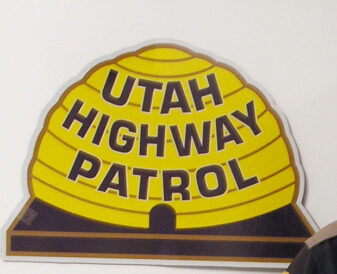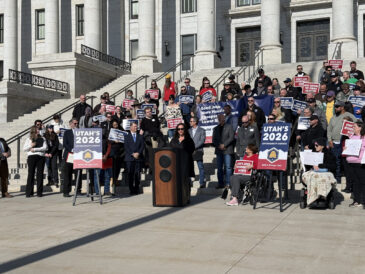Eagle Mountain voters may decide on recreation, arts and parks tax measure in November

Curtis Booker, Daily Herald
An Eagle Mountain sign sits along Pony Express Parkway as traffic flows Thursday, Jan. 16, 2025.Eagle Mountain officials are exploring ways to fund different amenities and projects that they say help enrich the lives of many of the city’s residents.
Eagle Mountain is considering a measure to be added to the November ballot that, if approved by voters, would create a dedicated funding source for recreation, arts and parks.
What’s known as the recreation, arts and parks tax, or RAP, is a 0.1% local sales tax that cities can use to fund various items and projects. The charge comes out to one cent for every $10 spent, or 10 cents for every $100 spent, on qualifying purchases within the respective city.
When people visit a retail store in nearby cities like Saratoga Springs, Lehi, American Fork or more than a dozen others across Utah Valley, a portion of the sales tax from their purchase goes toward arts and culture organizations, parks and other recreational areas.
Despite the city’s sprawling growth, Eagle Mountain is currently one of the few cities in Utah County without a RAP tax.
Eagle Mountain City Manager Ben Reeves noted that residents are already contributing to the tax when they shop in other cities.
“They’re already paying this tax and helping fund other communities’ parks and arts programs,” he said in a city-issued release Wednesday.
Tyler Maffitt, communications manager for Eagle Mountain, said city leaders feel the time is right to enact a RAP tax given the city’s population and economic growth.
“We consider it incredibly important that we are investing in the things that people who call this community home value most,” he said.
Maffitt added that Eagle Mountain has other projects like infrastructural and general operation needs that the city must prioritize when yearly budgets are being considered. So having a dedicated tax for amenities that residents enjoy in Eagle Mountain will help address funding needs for a wide range of projects.
“By having a dedicated revenue source through the RAP tax, we can not only invest in the things that people love most and stay competitive with our recreation, arts and parks offerings but we can equally be competitive with other things that are paid out of the general fund,” he told the Daily Herald when reached Wednesday morning.
Eagle Mountain anticipates the RAP tax, if approved by voters, could generate about $600,000 in its first year, with the revenue expected to grow alongside Eagle Mountain’s expanding economy, according to the city’s press release.
The tax could fund a variety of improvements, including upgrades to local and regional parks, expanded trail systems, enhanced playgrounds, new event pavilions, and even grants for local arts and cultural organizations.
Any final decisions on how RAP tax funds might be used would be at the discretion of the City Council, with input from a resident-led committee that would recommend projects during the city’s annual budget process.
“The cost to our shoppers should be considered minimal,” Maffitt said. “It could mean, however, millions of dollars over a decade that we can invest directly into our parks, our trails, and our cultural programming.”
The Eagle Mountain City Council is expected to make a final decision sometime in August regarding whether or not to place the proposed RAP tax onto the 2025 municipal general election ballot.



